The Joaquín Antonio Uribe Botanical Garden hosted ExpoMedeWeed, the First Medicinal Cannabis Fair in Medellín, Colombia between November 22 and 25, 2016. At the fair, in addition to presenting commercial exhibitors of brands and products related to the cultivation and use of Scientists and researchers also met, who presented academic conferences between November 22 and 24, and who was in charge of holding the First International Seminar on Cannabis Medicine in Colombia on the 25th.


The event had the participation of great international personalities such as the PhD. Lumir Hanus from Olomouc University, PhD. Cristina Sánchez from the Complutense University of Madrid, the Canadian businessman, activist and politician Marc Emery and the Daya Foundation of Chile, while for Colombia Dra. Paola Pineda Villegas, Academic Coordinator of the event; The doctor. Orlando Carreño, Scientific Director of the Antioqueño Group of Pediatric Neurology; he Curative Group, which brings together national researchers and different associations of cannabis mothers, women users of Cannabis, from indigenous growers of Cannabis, law firms offering advice for the legalization process, etc.
At the opening on November 22, Dra. Gloria Crispín from the Ministry of Justice and Law pointed out that the country is going through a historical moment in which changes in drug policies are being made, such as the legalization of Medicinal cannabis through law 1787 of July 2016. These changes have to do not only with matters of public health but also with human rights, that these changes may have a positive impact on Colombian agroindustrial development and that they constitute a clear line for the conduct of scientific research and in Colombia. In the words of Dra. Pineda, this space that brought together people from different parts of the world, “must be an example of tolerance and construction of knowledge.”
On the 23rd, the Grupo Curativa held a workshop on the plant and the endocannabinoid system, where historical aspects of the plant, the endocannabinoid system, the biology of the plant, the prices of pharmaceutical treatments versus cannabis treatments, and the mortality rates of both were explained. types of medicine. There was also a discussion about the myths and realities of medicinal Cannabis, where Dr. Pineda and Dr. Carreño were moderated by Susana Ferguson. The doctors discussed the importance of scientific disclosure, reliability and safety of the products of Cannabis in Colombia, the advantages and disadvantages of extraction methods, the substitution of drugs with Medical cannabis, the treatments and the medical ethics associated with them, and even the moderator put on the table topics such as the “sacred, powerful and mysterious” of the plant. The conclusions were that we must lose the fear of treating patients with THC, that if the Cannabis has not been formulated by a doctor so it is not about Medical cannabis and an invitation was made to “expand the mind” so that together we can improve the quality of life of patients.


The Colombian Post-conflict also had a space, in which the The Colombian Cannabis Community debated issues such as the substitution of illicit crops, the marginal situation of indigenous producers in Cauca, illegal growers who do not have legal tools, the scope of the law that, although it regulates medicinal use, continues to preserve the prohibitionist essence. This debate was centered around the war on drugs (A real war), and not only the post-conflict with the armed groups but the post-conflict of the war on drugs, the victims of prohibitionism, the future perspectives for Colombia and the alternatives that we can offer as a country and as citizens.
Cannabis mothers in Colombia raised their voices, met with the president of Mamá Cultiva de Chile and invited mothers to dare to use Cannabis, to fight for the legality and freedom of its medicinal use and to cultivate the medicine they require in their homes . They presented in an orderly manner the different challenges of treating different diseases with Cannabis and agreed that the greatest challenge is to get doctors to become in tune with medical Cannabis, lose their prejudices, change their paradigms and use this medicine. For this it is very important that the doctors study, update themselves. They pointed out the strength of Cannabis, affirming that it is the strongest medicine there is, since significant changes can be observed only 15 days after starting treatment. Cannabis mothers in Colombia deeply regret that the EPS are not in favor of the cannabis movement, since it is the families who must pay the costs of the treatments. They made an invitation to the attendees to inform themselves and join as groups, leaving aside the egos to unify efforts and avoid the drag of the big pharmaceutical companies and the advent of opportunistic businessmen more concerned with the growing business than with the physical or emotional health of the patients. .
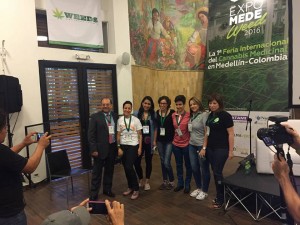

On November 24 it was the turn of the Daya Foundation, and its president Ana María Gazmuri spoke about the therapeutic use of Cannabis in Chile and how the programs developed by the Foundation contribute to improving the physical, spiritual and emotional well-being of people. Daya is the root of Mamá Cultiva Chile (which now has its own chapter in Argentina). They offer self-cultivation and oil preparation courses trying to ensure that each patient produces what they need safely and without incurring the purchase of illegal raw materials from traffickers. They presented their project of clinics, 11 in all of Chile, with trained medical personnel to offer high quality standards in patient care. Cannabis medicine is personalized, and the health professionals of the Daya Foundation (psychologists and doctors) are committed to this process. Fundación Daya considers that citizen mobilization is the appropriate strategy to put pressure on the system and make the changes we need.
On November 25, after the fair, the First International Seminar on Cannabis Medicine was held in Colombia, where the PhD was presented. Cristina Sánchez (Spain), Mara Gordon (USA), PhD. Lumir Hanus (Rep. Checa), MD Orlando Carreño (Colombia), MD Raquel Peyraube (Argentina), MD Marcelo Morante (Argentina), MD Paola Pineda (Colombia), MD Gisela Kuester (Chile), Ana María Gazmuri (Chile) y Paulina Bobadilla (Chile).
Dr. Cristina Sánchez, showed all the studies that she has carried out on the way that Cannabis works in cancer cells. Their discoveries not only show where in the brain they found the CB1 receptors, but how Cannabis slows down the uncontrolled growth of cells, the generation of new blood vessels, and slows down the process of metastasis of a very important way according to your statistics. Most interesting of all, Cannabis induces the death of tumor cells and only these, allowing healthy cells in the body to remain intact. In her study, the Doctor also commented, that there are no signs of poisoning anywhere in the body by Cannabis, which reaffirms the thesis that there are no deaths caused by this plant and its components.
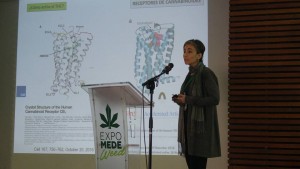

Dr. Mara Gordon spoke about the form of treatment with medical Cannabis. This treatment is not a panacea, since it does not eliminate the conditions by which the disease was created, in the case of cancer, it kills cancer cells, but it does not eliminate the toxicity condition for which the cancer occurred. He also spoke about the importance of the components of Cannabis together because of the synergy they have when treating a pathology. He spoke of the importance of terpenes in the individuality of each person and the impact they have. He stressed that without THC most diseases cannot be treated.


Hanus said that all Cannabis strains They are medicinal, but not all serve the same diseases, he pointed out the large number of compounds identified in the plant (1255) and was sincere about the limitations of cannabis medicine: “it does not always cure, it does not cure everything, it does not cure all diseases, does not cure any disease state ”and emphasized that currently the Cannabis is more a palliative treatment than a curative one, and this is due to a lack of evidence. He commented on the role of Cannabis against “orphan diseases”, and said that it works as an “orphan drug” and laid its position against the pharmaceutical isolates of Cannabis when affirming “man cannot be nature”, referring to the fact that we cannot obtain in laboratories the same products that have cost the plant thousands of years of evolution.
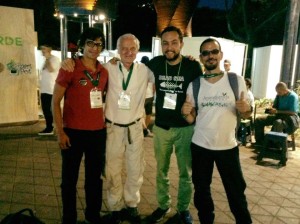

Carreño is a firm believer in evidence-based medicine, and calls for more evidence to be gathered about the use of medicinal Cannabis in Colombia. Only in this way will we be able to go from anecdote to scientific study. Studies that regulate doses, studies in tumors, studies in antiepileptic drugs, in the treatment of acute post-surgical pain, etc. are needed. However, Dr. Carreño believes in the benefits of the plant, he has seen them in his consultation, acknowledging that the study of cannabinoids is “an obligatory topic in conferences, publications and meetings around epilepsy”, he points out the importance of cannabis therapy in the treatment of fibromyalgia, a high-cost disease, because it occurs mainly among young adults of productive age, limiting their productivity. In summary, Dr. Carreño believes that “cannabinoids have already earned a place in the treatment of many diseases,” but he also does not miss the opportunity to remember that this is not a miracle medicine, that it is not completely innocuous and that neither is for everyone, so “if the Cannabis doesn’t work for you, find another therapy. ” For Carreño, the reduction of the cost of treatments and the eradication of charlatans that take advantage of the patients’ needs are prevailing needs.
Peyraube came to present the experience in Uruguay, “a country with a long history of civil liberties and peaceful demands.” He discussed the importance of legalization as a matter of public health (medical use) and the legalization of recreational use (adult use), qualifying the differences between the two processes. The Dra. Peyraube also does not believe that the molecules isolated from the pharmaceutical companies can be compared to the plant’s compounds, and says that the cannabis industry cannot be compared to Big Pharma. For her “Cannabis is not a god or a religion to believe or not in it. It is not that people do not believe in Cannabis, what they lack is study! ” She spoke about quality controls for different types of pollutants and closed her speech with the following statement: “The worst of legalizations is preferable to the best of prohibitions”
Morante guides the chair of Pain at the University of La Plata, and also identifies a major problem in education, because although the laws are approved and changed overnight, educational changes do not occur in the same way. For him, it is not a molecule, but a phenomenon as multivariable as pain or disease can be. Not surprisingly, 90% of cannabis prescriptions worldwide have to do with pain, he says. He believes that the key to cannabis medicine is the interaction and collaborative work between doctors and patients to “standardize the patient and not the substance”, always taking into account contraindications and adverse effects. He believes that scientific evidence about the therapeutic benefits is lacking, but he points out that right now the most problematic in the Argentine Republic are the safe and reliable sources of the substance.
Pineda presented his clinical experience in Colombia, with 1077 patients, 45% male and 55% female, with the majority of users in two groups: pediatric and elderly, in the treatment of multiple diseases, with the largest group of epileptic patients (389 patients), followed by cancer, fibromyalgia, and insomnia. Initially it detected little effectiveness because a couple of years ago cannabis products were just beginning to be manufactured in Colombia and there was not access to many quality extractions. The Dra. Pineda believes that further research, systematization of data and new routes of administration of cannabinoids should be carried out to increase the effectiveness of the treatments.
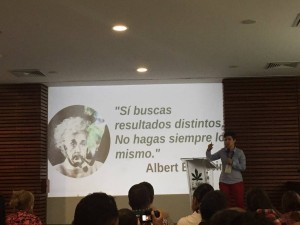

Gazmuri presented the process of creating the Daya Foundation and the process of social struggle that respect for self-cultivation has represented in this country, a battle that led to the largest legal cannabis plantation in all of Latin America. The Daya Foundation process has earned the respect of the highest Chilean authorities, and the research it is carrying out right now has the support of the Chilean Ministry of Health.
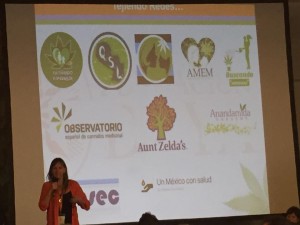

Kuester exposed the cases of several of his childhood patients in Chile, and how Cannabis has made a difference in the quality of life of many people, and spoke of the plans that are being developed.
Bobadilla came to tell about her experience in the head of Mamá Cultiva in Chile, and how many mothers have learned to relate to the plant in order to obtain medicine from their children.
The fair was a success, the organization showed off in every detail and the special guests lived up to the first event of its kind in Colombia. There is still a long way to go, and in the words of the Daya Foundation, it must be “a collective and caring way”, leaving egos aside and working together for a common interest. It is up to us to continue fighting prejudice to make Cannabis a therapy backed by the law, verified by science and respected by people.
Anandamida Gardens



